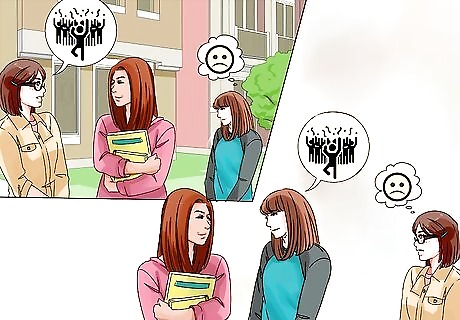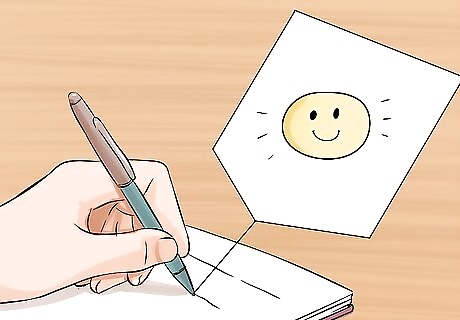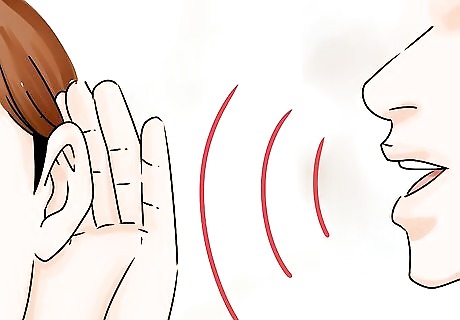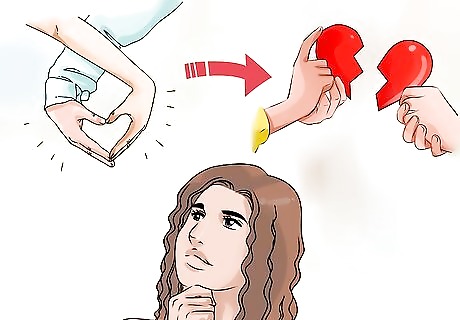
views
Coping in the Moment

Manage your emotions. In the direct aftermath of any kind of disappointment, it's vital to manage your emotions. Whether they're good or bad, you need to feel what you're feeling in order to process. Give yourself a day or so to experience your emotional reaction to a disappointment. You do not have to act on your emotions at this point and, in fact, it is better not to act. You can simply let yourself take a low-key day to consider how you're feeling. Do you feel angry? Confused? Afraid? It can help to do some light journaling, jotting down how the disappointment made you feel and why. It's important to experience your emotional reaction to an event. Your emotions can offer you insight into how much something meant to you. If you feel mildly annoyed that your boyfriend cancelled date night at the last minute, your disappointment may not be that significant. However, if you find yourself emotionally distraught all day over the let down, there may be deeper issues at play you need to address.

Try not to take it personally. While disappointment feels very personal, it's not always a shot at you. Even if it's hard, try not to take another person's failings personally. It's not necessarily a reflection of how that person feels about you. Many people have a tendency to internalize life's setbacks. You may feel if someone else let you down, you must have done something to bring that letdown on yourself. You may feel like you deserved it, attracted it, or are simply not good enough to have experienced a different outcome. Try to silence that negativity. This narrows your point of view in a way that's simply inaccurate. There are a variety of factors that may lead to a disappointment. The person who let you down did not, in all likelihood, intend to hurt you. Before personalizing disappointment, consider all the factors involved. Remind yourself that you don't know all the facts. If your best friend suddenly cancelled a lunch date, this can sting. However, maybe she was having a bad day. Maybe she experienced a disappointment of her own, at work or in her personal life, that affected her mood. She may have just wanted some time alone. While it's okay to be disappointed, try to remember you don't have all the facts.

Put yourself in the other person's shoes. Oftentimes, when we're feeling disappointed we may jump to thinking something like, "I would never do that to someone." However, is this really true? In reality, we all disappoint others all the time, whether intentionally or not. If you know anything about the other person's situation, put yourself in his or her shoes. How would you have acted? For example, say you're feeling let down because your friend went out to a club without you. The two of you had plans to stay in and watch a movie, but a co-worker your friend wants to get closer to invited her out at the last minute. If you initially feel hurt, you may feel your friend acted poorly and that you would never cancel plans like this. However, put yourself in the other person's shoes. Say your friend is new to the city. She's been struggling to make friends for a while and feels somewhat lonely. Maybe, given her situation, she was worried about alienating this co-worker and missing the opportunity to aggregate to a new community. Also, consider yourself from your friend's point of view. Are you the kind of person who enjoys going to clubs? If not, your friend may have decided it was better not to invite you as she figured you wouldn't have fun.

Be kind to yourself. If you're feeling a great deal of pain after a disappointment, it's important to practice some self care. Anger, resentment, and sadness are common emotions to experience in the wake of disappointment. Do something nice for yourself. Watch a movie, take a warm bath, or order take out. Giving yourself a small treat can help you better regulate your emotions.
Talking Things Out

Write down your thoughts. If you're unable to get over a disappointment, it's important you talk things out with the other person. Having a conversation about how someone hurt or disappointed you can be stressful. You should try writing your emotions out ahead of time. This way, you'll have your thoughts somewhat organized going into the conversation. Try to write down what you're feeling. After spilling your thoughts out onto the page, consider how you can best articulate them. Reword your thoughts a bit, trying to phrase them in a way that would make sense to another person. Also, keep in mind what you want to accomplish. Do you want an apology? Do you want the person to explain his or her actions? Do you want this person's behavior to change in the future? The answers to these questions can help guide your writing.

Have empathy. If you're going to have a difficult conversation with someone, enter the conversation with empathy. This will prevent you from coming off as combative during a discussion. Try to consider the other person's perspective as much as you can. Be open to listening to their side and genuinely considering it. Remember, the point of a conversation is to resolve a dispute and not to win it. There are two sides to every story and it's important to be open to the other person's side.

Go into the conversation without expectations. You should abandon any expectations you may have going into the conversation. If you expect things to go a certain way, you may feel disappointed or frustrated when they turn out differently. Allow the discussion to unfold naturally. Remember, you don't know how the other person will feel. It's unproductive to make assumptions ahead of time.

Use "I"-statements. "I"-statements are statements phrased in such a way to emphasize personal feeling over objective truth. When you use an "I"-statement, you make your feelings the main point of a sentence. You are not blaming or judging a person for his or her actions. You are simply stating how those actions made you feel and why. "I" statements have three parts. They begin with "I feel," followed by the emotion you're feeling. Then, you explain the action that lead to that emotion. Finally, you say why you felt the way you felt. The point of an "I"-statement is to minimize blame and judgement. You are not saying the person on the listening end is objectively wrong. Instead, you're saying how their actions made you feel. For example, if you're talking to your boyfriend and feeling frustrated, you may be inclined to say something like, "You make us late to every social event we go to and that's incredibly disappointing to me." The above statement can easily be rephrased into an "I"-statement. Your boyfriend will feel less judged, and may be more inclined to listen to your perspective if he understands he hurt your feelings. Using an "I"-statement, you could say something like, "I feel disappointed when we end up late to social events because I feel like you don't respect my need to see my friends."

Listen to the other person's point of view. Once you've explained how you feel, listen to the other person's perspective. Even if someone's behavior has disappointed you, there may be reasons for that behavior you do not understand. Try to be positive. The point of a conversation is to heal and move forward. Returning to the above example, maybe your boyfriend simply does not understand timetables like you do. He may say something like, "I guess I didn't realize 7 o'clock meant exactly 7 o'clock. When I go out with friends, we have a general time to meet and then people just kind of trickle in." The problem is an issue of communication rather than disrespect. Your boyfriend simply interprets timing for social events more loosely than you. In the future, you can try to be clearer about when precise timing is important.
Moving Forward

Examine your expectations. Sometimes, people may have unrealistic expectations of a relationship. If you're feeling disappointed with someone a lot, look at your own expectations. Can you see where your expectations may not be particularly realistic? Oftentimes, we may have expectations that seeped in from past relationships. For example, say your last girlfriend moved to a city to be with you. She did not have a lot of friends there and, as a result, hung out with you a lot. Your new girlfriend has been living in this city for a while. She may go out more and be less reliant on you for entertainment and socialization. If your expectation is that social events should always be done together, this may be a leftover expectation from your old relationship. It's not really reasonable, considering your new girlfriend's situation. You may also have expectations that are unrealistic in other ways. For example, your girlfriend may give you a "maybe" if you ask her if she wants to hang out later. For you, a "maybe" might come off as a "probably" or "definitely." You may find yourself consistently disappointed when your girlfriend lets you know she can't make it that night. Maybe your expectations are unrealistic. Many people, especially people with busy schedules, may simply be unable to commit some days. You can start seeing a maybe as a maybe, and expect that you may have to find something else to do that night.

Reframe your expectations as necessary. If your expectations do seem unreasonable, work on reframing them. Sometimes, future disappointment is less likely if you learn to accept certain things about another person. Let's return to our above example. Your new girlfriend is clearly more independent. She has her own life, her own career, and her own social circle. She may not be the type of person who needs a significant other to feel complete. In this case, try to reframe what you expect of a romantic relationship. In this relationship, you may not spend all your free time together. Your girlfriend may go out with just her friends a few times a week. Try to accept this is just your girlfriend's personality and it's not a bad thing. Next time she's going out for drinks with coworkers, you may be less disappointed that she can't come over and watch a movie after work.

Try again. Once you've reframed expectations, try again but on a different track. In any relationship, you have to be willing to compromise. If a friend, family member, or romantic partner has a different way of doing things, it's important that you allow that person that freedom. Proceed with the relationships, but with your expectations slightly altered. Try to be more accepting of the other person's perspective and more direct in how you communicate your own wants and needs.

Consider the big picture. When reeling after disappointment, it can be easy to get stuck going over one incident. However, keep the big picture in mind. Is this relationship important to you? Does this person bring more good into your life than bad? If so, the occasional disappointment is not worth getting upset over. Everyone disappoints another person on occasion, and it is usually unintentional. Try to let go and move forward.

Accept that relationships change. Oftentimes, a sense of disappointment in a relationship comes from the fact relationships change. It's possible you're holding on to past expectations that are no longer feasible. Try to allow a relationship to evolve and acknowledge that changes do not necessarily indicate something is wrong with a relationship. For example, look at a typical romantic relationship. At the beginning of the relationship, you and your partner may have sex more often, spend more time together, and talk constantly. As the relationship progresses, things may calm down some. You may have moments of silence, for example, and sex may be less frequent than how it was before. It's natural for the excitement of a new romance to fade with time. The intensity of the first few months of dating usually calms down. This is not necessarily a bad thing. While you may miss the thrill of a new romance, there are benefits to falling into a routine. The two of you are more comfortable together. You're both able to be yourself. Try to look at your changing relationship as an indicate of stability rather than stagnancy.




















Comments
0 comment